
The history of Israel covers an area of the Southern Levant also known as Canaan, Palestine or the Holy Land, which is the geographical location of the modern states of Israel and Palestine. From a prehistory as part of the critical Levantine corridor, which witnessed waves of early humans out of Africa, to the emergence of Natufian culture c. 10th millennium BCE, the region entered the Bronze Age c. 2,000 BCE with the development of Canaanite civilization, before being vassalized by Egypt in the Late Bronze Age. In the Iron Age, the kingdoms of Israel and Judah were established, entities that were central to the origins of the Jewish and Samaritan peoples as well as the Abrahamic faith tradition. This has given rise to Judaism, Samaritanism, Christianity, Islam, Druzism, Baha'ism, and a variety of other religious movements. Throughout the course of human history, the Land of Israel has seen many conflicts and come under the sway or control of various polities and, as a result, it has historically hosted a wide variety of ethnic groups.
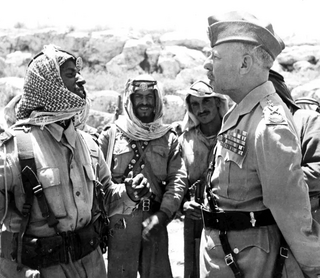
The 1948 Arab–Israeli War, also known as the First Arab–Israeli War, followed the civil war in Mandatory Palestine as the second and final stage of the 1948 Palestine war. The civil war became a war of separate states with the Israeli Declaration of Independence on 14 May 1948, the end of the British Mandate for Palestine at midnight, and the entry of a military coalition of Arab states into the territory of Mandatory Palestine the following morning. The war formally ended with the 1949 Armistice Agreements which established the Green Line.
In the 20th century, approximately 900,000 Jews migrated, fled, or were expelled from Muslim-majority countries throughout Africa and Asia, primarily as a consequence of the establishment of the State of Israel. Large-scale migrations were also organized, sponsored, and facilitated by Zionist organizations such as Mossad LeAliyah Bet, the Jewish Agency, and the Hebrew Immigrant Aid Society. The mass movement mainly transpired from 1948 to the early 1970s, with one final exodus of Iranian Jews occurring shortly after the Islamic Revolution in 1979–1980. An estimated 650,000 (72%) of these Jews resettled in Israel.
This article lists expulsions, refugee crises and other forms of displacement that have affected Jews.

Aliyah is the immigration of Jews from the diaspora to, historically, the geographical Land of Israel or the Palestine region, which is today chiefly represented by the State of Israel. Traditionally described as "the act of going up", moving to the Land of Israel or "making aliyah" is one of the most basic tenets of Zionism. The opposite action – emigration by Jews from the Land of Israel – is referred to in the Hebrew language as yerida. The Law of Return that was passed by the Israeli parliament in 1950 gives all diaspora Jews, as well as their children and grandchildren, the right to relocate to Israel and acquire Israeli citizenship on the basis of connecting to their Jewish identity.

The history of the Jews in Egypt goes back to ancient times. Egyptian Jews or Jewish Egyptians refer to the Jewish community in Egypt who mainly consisted of Egyptian Arabic-speaking Rabbanites and Karaites. Though Egypt had its own community of Egyptian Jews, after the Jewish expulsion from Spain more Sephardi and Karaite Jews began to migrate to Egypt, and then their numbers increased significantly with the growth of trading prospects after the opening of the Suez Canal in 1869. As a result, Jews from many territories of the Ottoman Empire as well as Italy and Greece started to settle in the main cities of Egypt, where they thrived . The Ashkenazi community, mainly confined to Cairo's Darb al-Barabira quarter, began to arrive in the aftermath of the waves of pogroms that hit Europe in the latter part of the 19th century.

Mahal, more often spelled Machal, refers to the group of overseas volunteers who fought alongside Israeli forces during the 1948 Arab–Israeli War. Some 4,000 volunteers, mostly Jews but also non-Jews, arrived from all over the world. Mahal is an acronym of מתנדבי חוץ לארץ.
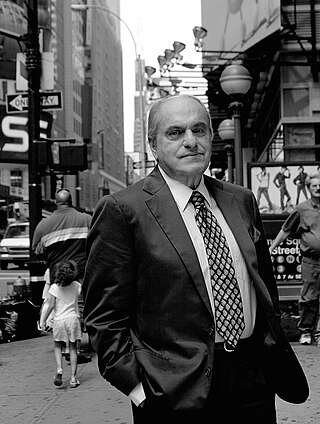
Leon Charney was an American real estate tycoon, attorney, author, philanthropist, political pundit, media personality and Jewish cantor. He lived in Manhattan in New York City, dividing his time between his residences in Tel Aviv and Boca Raton, Florida. In March 2012, Forbes listed Charney as No. 353 among the wealthiest Americans. He was a graduate of Yeshiva University where he participated in demonstrations to free Soviet Jewry, and Brooklyn Law School.

Middle Eastern cinema collectively refers to the film industries of West Asia and part of North Africa. By definition, it encompasses the film industries of Egypt, Iran, Bahrain, Iraq, Jordan, Kuwait, Lebanon, Palestine, Oman, Qatar, Saudi Arabia, Syria, United Arab Emirates, and Yemen. As such, the film industries of these countries are also part of the cinema of Asia, or in the case of Egypt, Africa.
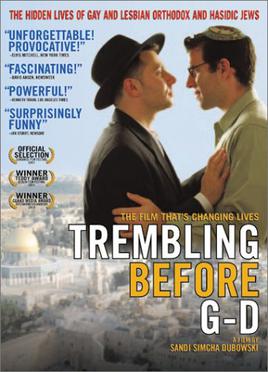
Trembling Before G-d is a 2001 American documentary film about gay and lesbian Orthodox Jews trying to reconcile their sexuality with their faith. It was directed by Sandi Simcha DuBowski, an American who wanted to compare Orthodox Jewish attitudes to homosexuality with his own upbringing as a gay Conservative Jew.

The Arab–Israeli conflict is the phenomenon involving political tension, military conflicts, and other disputes between various Arab countries and Israel, which escalated during the 20th century. The roots of the Arab–Israeli conflict have been attributed to the support by Arab League member countries for the Palestinians, a fellow League member, in the ongoing Israeli–Palestinian conflict; this in turn has been attributed to the simultaneous rise of Zionism and Arab nationalism towards the end of the 19th century, though the two national movements had not clashed until the 1920s.

Cinema of Israel refers to film production in Israel since its founding in 1948. Most Israeli films are produced in Hebrew, but there are productions in other languages such as Arabic and English. Israel has been nominated for more Academy Awards for Best Foreign Language Film than any other country in the Middle East.

The history of the Jews in Sudan goes back to a small but vibrant community of Jews who lived there from about 1885 to around 1970. Most of the community left for Israel or Europe after anti-Semitic attacks began to spread against both the Jews in Israel and those still living in Sudan.

Ruggero Gabbai is an Italian film director and photographer.

The 1948 Palestine war was fought in the territory of what had been, at the start of the war, British-ruled Mandatory Palestine. During the war, the British withdrew from Palestine, Zionist forces conquered territory and established the State of Israel, and over 700,000 Palestinians fled or were expelled. It was the first war of the Israeli–Palestinian conflict and the broader Arab–Israeli conflict.

Above and Beyond is a 2014 documentary film about Mahal, produced by Nancy Spielberg, the youngest sister of Steven Spielberg,, written by Sophie Sartain, and directed by Roberta Grossman.
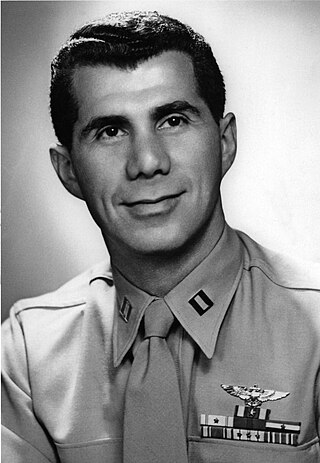
Louis Lenart was a Hungarian-born American-Israeli fighter pilot. His exploits during the 1948 Arab-Israeli War were documented in the 2015 documentary film A Wing and a Prayer.

Frank Sinatra was a strong supporter and activist for Jewish causes in the United States and Israel. According to Santopietro, Sinatra was a "lifelong sympathizer with Jewish causes". Sinatra participated in Hollywood protests and productions supporting Jews during the Holocaust and the formation of the State of Israel. He actively fund-raised for Israel Bonds, the Hebrew University of Jerusalem, and the Simon Wiesenthal Center, and helped establish two intercultural centers in Israel which bear his name. Due to his support of Israel, his recordings and films were banned by the Arab League and by Lebanon.
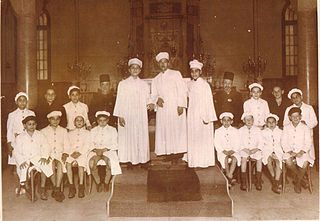
The history of the Jews in Alexandria dates back to the founding of the city by Alexander the Great in 332 BCE. Jews in Alexandria played a crucial role in the political, economic, cultural and religious life of Hellenistic and Roman Alexandria, with Jews comprising about 35% of the city's population during the Roman Era.
Nancy Spielberg is an American film producer who has produced multiple documentaries on Jewish and Israeli history. She is the third youngest sister of director and producer Steven Spielberg.

















